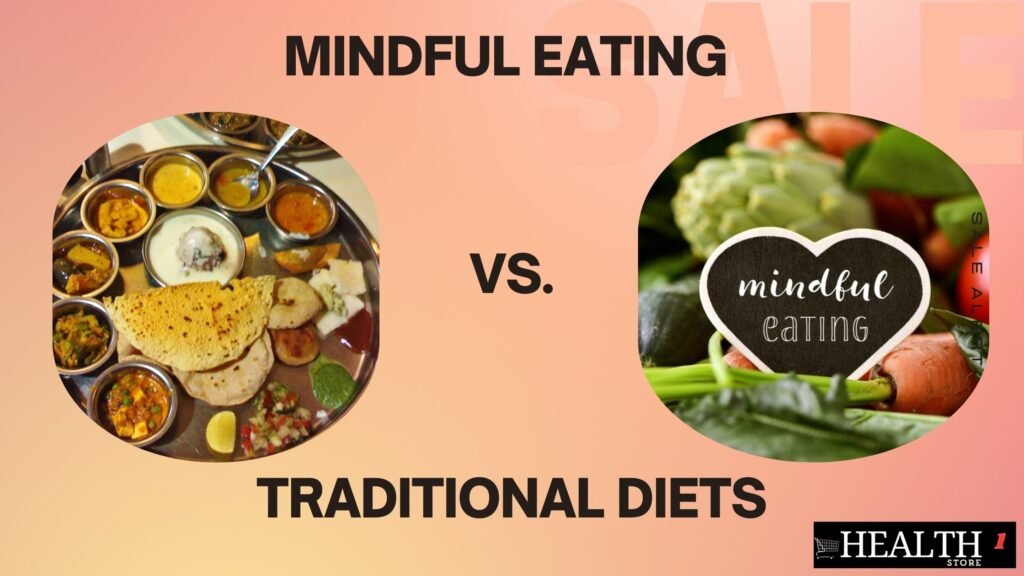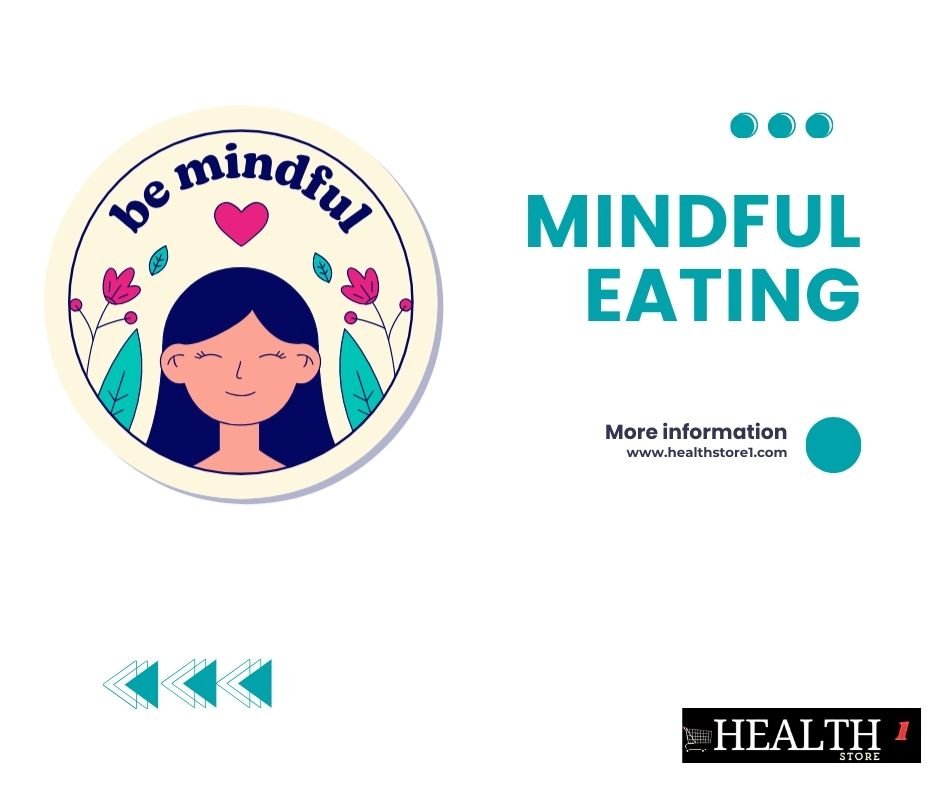Introduction
Crash diets and extreme exercise programs often dominate any conversation about weight loss. But what if there was a simpler, more sustainable way to shed pounds without drastic lifestyle changes? Mindful Eating is a practice that focuses on developing a healthy relationship with food by paying attention to hunger cues, savoring each bite, and listening to your body’s signals. This article will explore how Mindful Eating can lead to sustainable weight loss and why it’s more effective in the long run than restrictive diets.
Table of Contents
Mindful Eating
What is it?
Mindful Eating is a concept rooted in mindfulness, a practice of being fully present and aware in the moment. When applied to eating, it encourages people to slow down, savor their meals, and pay attention to their body’s hunger and fullness signals. Mindful eaters focus on the sensory experience of eating—the taste, texture, and aroma of food—while eliminating distractions like phones or TV.
Unlike traditional dieting, which focuses on external rules such as calorie counting or food restrictions, Mindful Eating emphasizes internal cues, making it a more sustainable approach to weight loss.

How Does it Work?
It operates on several principles that can help individuals develop healthier eating habits and make more conscious food choices:
- Eating Slowly and Savoring Food: Mindful eating encourages you to eat at a slower pace, giving your body time to recognize when you’re full. This can help prevent overeating and reduce calorie intake naturally.
- Recognizing Hunger and Fullness Cues: One of the main aspects of mindful eating is learning to recognize when you’re truly hungry and when you’re satisfied, preventing unnecessary snacking or emotional eating.
- Avoiding Distractions While Eating: Eating in front of the TV or while on your phone often leads to mindless consumption of food. Mindful eaters focus on the meal at hand, leading to better portion control.
- Making Thoughtful Food Choices: Rather than reaching for highly processed, calorie-dense foods, mindful eaters are more likely to choose nutritious, whole foods that fuel their bodies.
Mindful Eating and Weight Loss
Numerous studies have shown a strong link between it and weight loss. While it may not lead to rapid results like crash diets, mindful eating promotes gradual, long-term weight loss by encouraging healthier behaviors around food.
Scientific Support:
- Hunger Cues and Caloric Intake: A study published in the Journal of Obesity showed that individuals who practiced mindful eating were more in tune with their hunger cues and naturally consumed fewer calories. On average, they reduced their daily caloric intake by 300-500 calories without consciously restricting food.
- Reduced Emotional Eating: Research from Appetite Journal found that people who practiced mindful eating experienced a significant reduction in emotional eating behaviors. Emotional eating, which often leads to overeating, was reduced by 40-50% in participants.
- Sustainable Weight Loss: A meta-analysis in the Journal of Behavioral Medicine concluded that individuals who adopted mindful eating practices experienced an average weight loss of 3-4 kg (6.6-8.8 lbs) over a 12-week period. More importantly, they were able to maintain the weight loss for longer compared to those on restrictive diets.
Mindful Eating vs. Traditional Diets
While traditional diets often focus on what you should or shouldn’t eat, Mindful Eating takes a different approach by encouraging you to eat what you love, but in moderation and with awareness. Here’s how it compares to other weight loss methods:

| Aspect | Traditional Dieting | Mindful Eating |
|---|---|---|
| Focus | Restriction and calorie counting | Awareness and body signals |
| Short-Term Results | Rapid weight loss | Gradual weight loss |
| Sustainability | Often difficult to maintain | Easier to sustain long-term |
| Emotional Impact | Can lead to stress, guilt, and cravings | Promotes a positive relationship with food |
| Food Choices | Limited variety | Enjoy all foods in moderation |
Why it is More Sustainable?
Traditional diets often lead to a cycle of restriction, bingeing, and guilt. When individuals deprive themselves of certain foods, cravings can intensify, making it hard to stick to the plan long-term. In contrast, Mindful Eating allows individuals to enjoy the foods they love without overindulging, making it easier to sustain healthy eating habits for life.
Practical Tips
To incorporate Mindful Eating into your lifestyle and accelerate your weight loss journey, follow these simple tips:
- Eat Slowly and Without Distractions: Set aside time to eat in a calm environment. Avoid multitasking while eating, such as watching TV or scrolling through your phone.
- Savor Every Bite: Focus on the sensory aspects of your meal. How does the food taste, smell, and feel? Engaging your senses can make the eating experience more satisfying, even with smaller portions.
- Listen to Your Body: Pay attention to your hunger and fullness cues. Eat when you’re hungry, and stop when you feel satisfied, rather than stuffed.
- Practice Gratitude: Before eating, take a moment to appreciate your food and its journey to your plate. This practice can help cultivate a positive relationship with food.
- Recognize Emotional Triggers: Many people turn to food for comfort during stress or boredom. By practicing mindfulness, you can identify emotional triggers and choose healthier coping mechanisms.
It’s Benefits Beyond Weight Loss
While it is an effective tool for weight loss, its benefits go beyond shedding pounds. Adopting a mindful approach to eating can improve overall health and well-being in several ways:
- Improved Digestion: Eating slowly and chewing thoroughly can aid digestion, preventing issues like bloating and indigestion.
- Better Relationship with Food: Mindful eating fosters a more positive relationship with food, helping to eliminate guilt and food-related anxiety.
- Enhanced Enjoyment of Food: When you eat mindfully, you fully experience and enjoy each bite, leading to greater satisfaction with smaller portions.
- Reduced Stress: Mindful practices, including eating, have been shown to reduce stress and improve mental well-being by promoting mindfulness in everyday activities.

Conclusion
Mindful Eating offers a powerful, sustainable alternative to restrictive dieting. By focusing on internal hunger cues, savoring food, and avoiding distractions, mindful eaters naturally consume fewer calories and develop healthier eating habits. Research shows that practicing Mindful Eating can lead to long-term weight loss, reduced emotional eating, and improved well-being.
Unlike traditional diets that often lead to yo-yo weight loss, Mindful Eating encourages a balanced approach to food that promotes sustainable results. Whether you’re just starting your weight loss journey or looking for a way to maintain your progress, incorporating mindful eating practices can be a game-changer.
With its emphasis on awareness, moderation, and self-compassion, Mindful Eating truly could be the key to unlocking lasting, sustainable weight loss.



